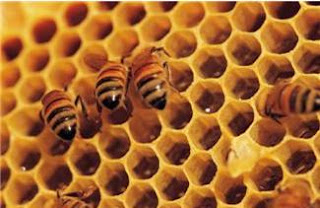Janna Dodds - Bees and Pollinators

At our last meeting Janna Dodds shared her experience about Bee Keeping.
One of the most common benefits of beekeeping is the delicious result of honey, but there are also many other benefits. The bees pollinate our plants and are needed for a harvest of many vegetables and fruits. The honey is a great sweetener but in its raw (unpasteurized) form it also has many natural healing properties.
In recent years there has been a dramatic decline of 60% in domestic honey bees and here are some of the reasons:
· Parasites and mites are killing them
· Pesticides on the plants
· Virus attacking the bees immune system
· Global warming – when the weather warms up and then freezes again the bees come out of hibernation and then die when it freezes again.
If you would like to attract bees to your garden you will need three things
1) a place for them to nest (old dead trees trunks) or this product out of Palgrave – www.pollenbeenest.com
2) A clean water source nearby
3) Flowers that will attract them, some of them are: Asters, blackeyed susan’s, Lupin, sage, lilac, sunflowers, coneflower, currants, Yellow is a favourite colour of theirs
Health benefits of unpasteurized honey. (Never feed honey to children younger than 1 year)
· Trace minerals
· Vitamins – Potassium, trace amounts of C, B, K, A
· Contains enzymes that eat bacteria
· You can put it over wounds and because it breathes like our skin Honey can facilitate faster healing
· Antiseptic and antibacterial
· Some people have found that eating 1 tsp of local honey per day has helped them with allergies and hayfever.
· Manuka Honey that comes from New Zealand has the highest count of nutrients of any known honey
My favourite recipe for a sore throat, post nasal drip or constant cough is the following
· Glass of warm water, 1 tsp of honey, 1 – 2 tsp of freshly squeezed lemon juice.
If you are going to use honey as a natural healing option you need to be very aware of the source of the honey. You want the bees to be collecting from plant sources that are pesticide free and non-gmo.
Some points that Jana shared about her bee keeping
· Each bee hive creates about 100 pounds of honey
· Her favourite tool for sweeping bees off the sections to collect the honey is a goose feather.
· Each hive needs a queen, drones and workers
· The queen is feed the royal jelly
· Honey has a long shelf life and can be kept for a long time
· Worker bees live for 35 – 40 days
For more information she suggests a book called “Beekeeping for Dummies” To contact her for honey or questions she can be reached at: 519-338-5863
.png)
.png)
Comments
Post a Comment